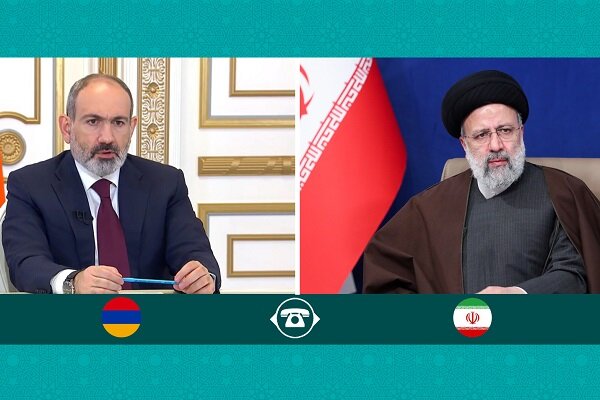"The Caucasus region is going through special situations and unfortunately, peace has not yet returned to this region," said the Iranian President in the phone talk with Prime Minister of Armenia Nikol Pashinyan on Tuesday.
He also pointed to the Zionist regime's influence in the region, describing its presence as a threat to the entire region, including its hosts.
Stating that Iran is carefully following the developments in the region, Raeisi said that the region cannot tolerate another war.
Security in the Caucasus region is very important for the Islamic Republic of Iran, the Iranian President underlined, adding that the signatories of the tripartite ceasefire statement should adhere to its provisions and refrain from any action to create tension in the region.
"The historical borders of Iran and Armenia are considered the basis of prosperity, convergence and security of the region, and Tehran is determined to continue cooperation in all fields for the benefit of the prosperity and stability of the region.
During the phone talks, Pashinyan, for his part, provided the Iranian President with details of the recent clashes between the two countries.
He also said that the Islamic Republic of Iran has always played a constructive and influential role in resolving tensions and crises in the region.
Pashinian also expressed satisfaction with the expanding relations between Tehran and Yerevan, saying that Armenia seeks to deepen relations with the Islamic Republic of Iran in all fields.
Armenia and Azerbaijan have reported new border clashes that left a number of Azerbaijani and Armenian troops dead.
Tensions flared overnight in the latest escalation of decades-old hostilities between the two countries in the south Caucasus over control of the disputed region. Each side blamed the other for the fighting.
The two countries agreed on a ceasefire early on Tuesday to halt a flare-up in hostilities over the Karabakh region, but it fell apart minutes later, Azerbaijani media said.
Conflict first broke out in the late 1980s, when both sides were under Soviet rule and Armenian forces captured swathes of territory near Karabakh, long recognized internationally as Azerbaijan’s territory. About 30,000 people died in the ensuing conflict.
Azerbaijan regained those territories in the 2020 fighting, which ended with a Russian-brokered truce and thousands of residents returning to homes from which they had fled. More than 6,500 people lost their lives in the six-week war.
The leaders of both countries have since met several times to hammer out a treaty intended to establish a lasting peace.
During EU-mediated talks in Brussels in May and April, Azerbaijani President Ilham Aliyev and Armenian Prime Minister Nikol Pashinyan agreed to “advance discussions” on a future peace treaty.
Pashinyan on Tuesday also held separate phone calls with Russian President Vladimir Putin and French President Emmanuel Macron on the latest clashes, according to the Armenian government.
ZZ/5588948

























Your Comment